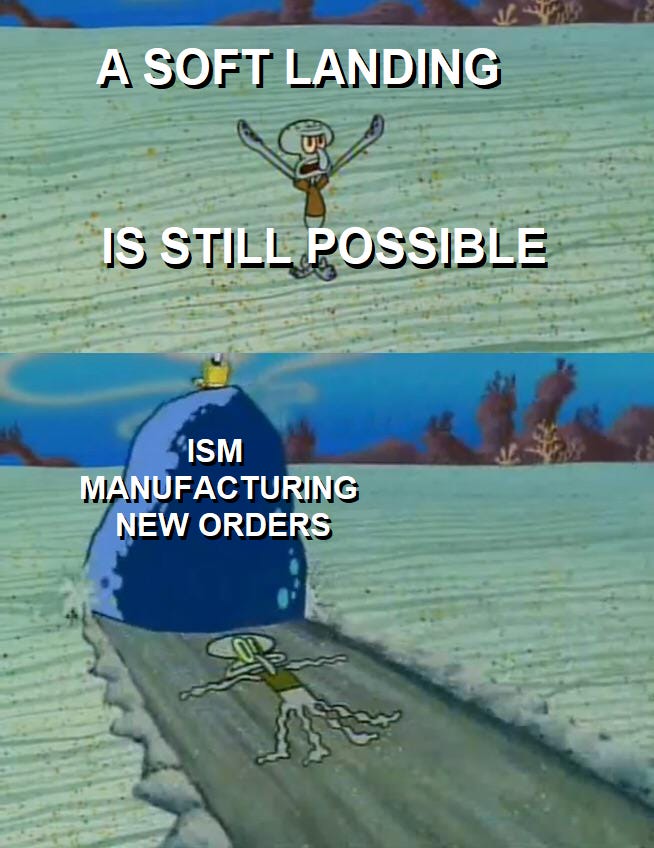Over the last three days, the hope that the Fed will be able to engineer a “soft landing” has been crushed. First the Atlanta Fed put out their latest GDPNow estimate. This is a model built by the Atlanta Fed to attempt to track GDP. It should be viewed as a running estimate. On June 30th, they pegged the 2Q as contracting -1.0%. They have now revised their estimate lower to -2.1%.
This puts the economy into the technical recession category as the 1Q final GDP calculation came in at -1.6%. Remember it takes two consecutive quarters of negative GDP expansion to qualify as an NBER officially endorsed recession. At this point, we’ve already officially logged one negative quarter and with the Atlanta Fed projecting the 2Q will be negative, on September 29th the NBER should announce that the US went into recession in the first quarter.
In addition to the GDPNow estimate, the ISM Manufacturing PMI came out today. While the PMI hung in at 53 (remember anything above 50 indicates expansion), the new orders category came in at 49.2 while the ISM Prices stayed elevated at 78.5. With new orders shrinking and prices staying elevated, this is the definition of stagflation.
On top of these two developments, we’ve also seen a rise in unemployment claims since March 19th.
A little over a month ago I had highlighted increased tech layoffs. At the time I said,
“Hiring freezes are the first step in this dance. Freezes lead to hour cutting. After hour cutting are layoffs.”
This has caused the bond market to go crazy. This past week the 10 year yield went from 3.21 to 2.89. That's nearly a 10% move. This is a big change to happen in the bond market in only a weeks’ time. It looks like traders are moving into a risk-off type of environment where the perceived safety of bonds are getting bid. I don’t think the selloff in the stock market has abated and neither does Nouriel Roubini.
Mr Roubini asks some very good questions in his article. Specifically question 4 and 6.
The fourth question is whether a hard landing would weaken central banks’ hawkish resolve on inflation. If they stop their policy tightening once a hard landing becomes likely, we can expect a persistent rise in inflation and either economic overheating (above-target inflation and above potential growth) or stagflation (above-target inflation and a recession), depending on whether demand shocks or supply shocks are dominant.
Late last year I had argued that the Jerome Powell and the Fed would not be able to withstand the pressure of a deep and prolonged recession. That they would tap-out, lower interest rates, and restart QE. I still believe this to be true but I also believe that the Fed will not be quick to action. At the earliest, they will wait until we get closer to the NBER officially announcing a recession.
That brings us to the final question: Will equity markets rebound from the current bear market (a decline of at least 20% from the last peak), or will they plunge even lower? Most likely, they will plunge lower.
Nouriel Roubini can often be a mixed bag. He bad-mouthed bitcoin right after it peaked at around $20k at the end of 2017. A year later it began an amazing run, eventually hitting over $60k. He’s lashed out at Austrian Economists by creating straw-man arguments but Robert Wenzel recognized that he was “very well connected in the world of the financial power elite”.
If Roubini is putting out this kind of article in Marketwatch, it is because he is sending out a warning to the big boys in the industry. The Fed isn’t riding to the rescue soon. It is going to take some time for them to act and right now they are laser focused on bringing down inflation.
The market is closed on Monday for the July 4th holiday. Hopefully it will give me some time to catch-up on my portfolio build. I appreciate your patience! I believe it will payoff soon.








